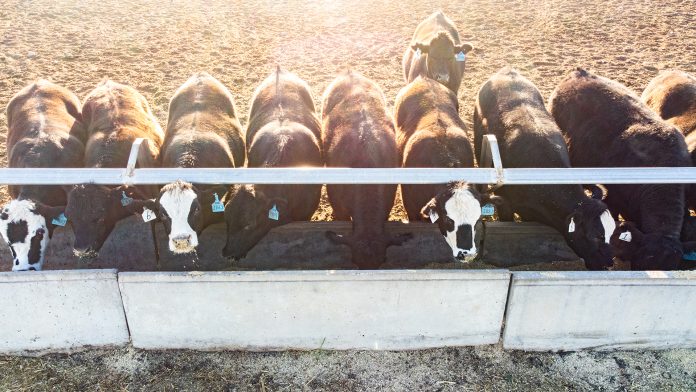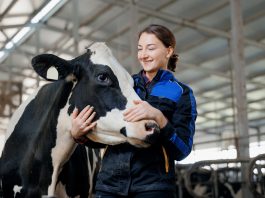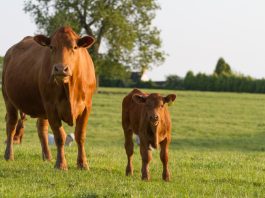Steve Meller, the CEO of CH4 Global, discusses how the company is harnessing the methane-reducing properties of Asparagopsis seaweed to create a scalable and cost-effective cattle feed additive that significantly reduces methane emissions.
In the battle against climate change, methane emissions are the new frontline. This potent greenhouse gas, with over 80 times the warming potential of CO₂ over a 20-year period, is a key driver of near-term warming. And when it comes to human-caused methane emissions, one source stands out: cattle.
Livestock agriculture accounts for nearly one-third of anthropogenic methane, with beef and dairy cattle the primary contributors. As demand for protein to feed the world’s population continues to rise, so, too, do emissions – painting a bleak picture for our climate future.
But what if there were a natural, cost-effective way to dramatically reduce methane from cattle? A solution that didn’t require a complete overhaul of agricultural systems but instead worked within them?
At CH4 Global, we’ve dedicated ourselves to answering those questions. And in the process, we’ve unlocked the door to scaling one of the most exciting climate innovations of the decade: methane-busting Asparagopsis seaweed.
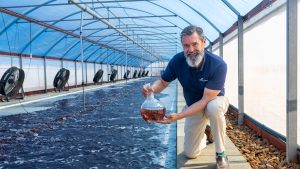
The power of Asparagopsis
Our journey began in 2018 when I co-founded CH4 Global with the goal of delivering climate impact at scale with urgency. For us, that meant targeting livestock methane emissions by developing a scalable, affordable solution. We knew that to succeed, we’d need a product that was not only highly effective but also easy for farmers to adopt and economically viable across the value chain.
Enter Asparagopsis. This unassuming red seaweed harbours a remarkable secret: when added to cattle feed in small quantities, it has been shown to reduce methane production in the rumen by over 90%.
The discovery of Asparagopsis’ methane-inhibiting properties is a fascinating story in itself. In 2014, a team of researchers at Australia’s Commonwealth Scientific and Industrial Research Organisation and James Cook University noticed something remarkable: in lab studies, adding Asparagopsis to an artificial rumen slashed methane production almost entirely. Subsequent trials in live cattle and sheep confirmed the effect.
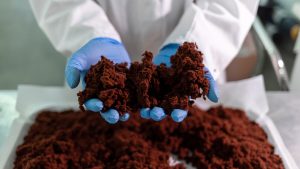
The key is the suite of bioactive compounds naturally produced by the seaweed. Among them, bromoform plays the most significant role, working alongside the others to disrupt the enzymatic process that produces methane in a cow’s gut, preventing methane emissions before they form.
For a cattle industry under increasing pressure to curb its climate footprint, the implications were game-changing. Here was a natural, seaweed-based solution that could deliver dramatic methane reductions without requiring a complete overhaul of farming practices. But there was a challenge: Asparagopsis had never been cultivated at a commercial scale before.
The road to scale
Determined to unlock the full climate potential of Asparagopsis, CH4 Global set out to develop a scalable, cost-effective way to integrate it into cattle feed. Our goal was clear: to produce a consistent, shelf-stable Asparagopsis product based on the whole, natural plant, as opposed to extracting a single bioactive compound from the seaweed or synthesising one in a lab. Crucially, we had to do it in a way that ensured our product could be easily adopted by farmers and be priced low enough to guarantee economic viability across the supply chain.
Achieving this would require overcoming significant challenges. Traditional approaches to seaweed cultivation either relied on costly commercial or home-built indoor tank systems or involved growing the seaweed in the open ocean, where it was subject to high variability and seasonality. To cultivate Asparagopsis at scale and deliver a reliable, affordable end product, we knew we’d need to innovate.
Our solution: the EcoPark system – a proprietary, pond-based cultivation platform that slashes capital and operating costs to as little as one-tenth of traditional tank-based seaweed farming. The ponds are enclosed in polytunnels that provide optimal growing conditions while ensuring a steady, high-quality supply of Asparagopsis. The harvested seaweed is then processed and combined with other safe ingredients to make our cattle feed additive, Methane Tamer™, which is produced at a cost that enables large-scale adoption and ensures profitability throughout the agricultural value chain – without requiring government subsidies.
A new era begins
In January 2025, CH4 Global officially opened Phase One of the world’s largest commercial Asparagopsis production facility – our first EcoPark in Louth Bay, South Australia. The EcoPark represents a true revolution in Asparagopsis cultivation, capable of churning out industrial quantities of seaweed at a fraction of the cost of traditional methods. At full capacity, its 500 ponds could produce enough Asparagopsis to serve hundreds of thousands of cattle per day.
This expansion comes as CH4 Global accelerates the global adoption of Methane Tamer™ through key strategic partnerships:
- In 2023, we initiated a strategic partnership with Lotte International, a subsidiary of South Korea’s Lotte Group. This collaboration began with supplying our Methane Tamer™ feed supplement to Lotte’s Australian feedlot, Sandalwood, where Wagyu beef cattle are currently consuming it.
- In late 2024, we partnered with UPL, one of the world’s largest agricultural solutions companies, with the aim of bringing Methane Tamer™ to millions of cattle across India, Brazil, Argentina, Uruguay, and Paraguay – markets that collectively account for over 40% of the global cattle population. This collaboration leverages UPL’s deep market knowledge, customer relationships, and distribution networks to drive large-scale adoption of methane reduction solutions in key livestock-producing regions.
- In early 2025, we announced a partnership with Mitsubishi Corporation to expand commercial sales in Australia and Japan, where there are approximately four million cattle. The agreement also includes plans to explore large-scale Asparagopsis production opportunities in Southeast Asia, further strengthening our ability to meet growing global demand.
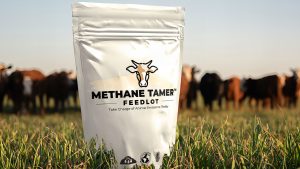
In addition to these strategic partnerships, Chipotle Mexican Grill, one of America’s ten largest restaurant chains, recently invested in CH4 Global, becoming one of the first major food brands to directly support methane reduction at the source. Their backing signals a growing industry recognition that cutting livestock methane emissions isn’t just a climate imperative – it’s essential to responsibly meet corporate sustainability commitments.
Beyond methane reduction: The full value of Asparagopsis
While CH4 Global is on a mission to deliver gigatonne-scale emissions reductions over the next decade, the benefits of feeding cattle Asparagopsis go well beyond climate impact.
Methane production in cattle isn’t just an emissions issue – it’s also an energy loss problem. Studies show that reducing methane production allows cattle to retain more energy from their feed, leading to greater feed efficiency. One recent study found a 7.4% improvement, meaning cattle required less feed to achieve the same growth. Given rising feed costs, this represents significant savings for producers.
At the same time, demand for low-methane beef and dairy is growing. Some markets are already exploring premium pricing for reduced-methane products, and even a small price premium could make adoption profitable for farmers. Additionally, CH4 Global is working toward third-party verification for methane reductions, enabling farmers to generate carbon credits – creating an additional revenue stream for producers.
Regulatory changes are also driving interest. Denmark has already enacted a methane tax, and similar proposals are emerging in other regions. Trade policies such as the EU’s Carbon Border Adjustment Mechanism could impose tariffs on beef and dairy produced without emissions reduction measures while providing preferential access to lower-emission alternatives. Farmers who adopt methane-reducing solutions early may avoid future regulatory costs and gain a competitive edge.
For decades, reducing methane in cattle was seen as an unsolved challenge. Methane Tamer™ is changing that – transforming methane reduction from a cost burden into a financial and competitive advantage.
The path forward
Scaling a new ingredient across the global cattle industry is complex, but the momentum is undeniable. With the Louth Bay EcoPark operational, major industry partnerships in place, and increasing interest from food brands, the path to gigatonne-scale climate impact is clearer than ever.
Through our collaborations with Lotte, UPL and Mitsubishi, we are laying the foundation for global market expansion. Meanwhile, Chipotle’s investment underscores the growing demand from food brands for science-backed climate solutions. As more companies work to lower their supply chain emissions, feed additives like Methane Tamer™ will become central to industry-wide climate strategies.
As CH4 Global looks to build additional EcoParks, deepens partnerships, and expands Methane Tamer™ to millions of cattle, one thing is certain: the age of methane-busting seaweed has arrived – and CH4 Global is at the forefront.
Please note, this article will also appear in the 21st edition of our quarterly publication.

